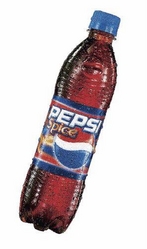PepsiCo sues Pepsi Bottling Group over meeting
Published: Tuesday | May 12, 2009

Soft drink maker PepsiCo Inc said Monday it is suing its largest bottler, marking the company's first move since Pepsi Bottling Group and another bottler rejected takeover bids last week.
PepsiCo said in a statement that Somers, New York-based Pepsi Bottling intentionally failed to notify it of a recent board meeting where a shareholder rights plan was approved.
Those plans, known as 'poison pills', are used to try to hold off hostile takeover attempts by making it more expensive for a suitor to acquire shares.
Purchase, New York-based PepsiCo said in the suit filed in Delaware against Pepsi Bottling and the bulk of its board of directors the action should be invalid. It's asking for declaratory and injunctive relief.
A spokesman at Pepsi Bottling did not immediately return a message left seeking comment Monday.
Pepsi Bottling and PepsiAmericas last week rejected PepsiCo's US$6 billion takeover bid, saying it undervalues them.
PepsiCo said Monday it continues to believe its offers are fair.
Invalid actions
In the lawsuit PepsiCo said two of its executives who sit on Pepsi Bottling's board of directors were not notified of meetings, which makes actions taken at those meetings invalid. According to the suit, John C. Compton, chief executive of PepsiCo Americas Foods, and Cynthia M. Trudell, PepsiCo's chief personnel officer, received an email from Pepsi Bottling senior counsel Steven Rapp saying because they would have to recuse themselves from the meetings they would not be notified of meetings where the deal is the sole topic of discussion.
But PepsiCo argues that Compton and Trudell should have been notified.
"In order for the special meeting to have been valid, Compton and Trudell must have been provided notice and given an opportunity to participate or to recuse themselves where appropriate," PepsiCo said in the lawsuit.
The company also said since topics other than the deal were discussed, chiefly the poison pill, the two other board members should have been told about the meeting.

Nooyi
PepsiCo also said that measure, and others regarding boosting executive pay if a certain amount of Pepsi Bottling Group's outstanding shares are acquired by any entity, are not in the best interest of shareholders, including PepsiCo.
PepsiCo, maker of brands like Gatorade, Pepsi colas and Tropicana juices, first made the offer in April, and has maintained that the deal would help transform its business and help it save at least US$200 million a year before taxes.
The company says it will be able to respond more quickly to a changing marketplace, one where consumers are focusing less on soft drinks and more on juices and teas.
If the sale went through, PepsiCo would control 80 per cent of its total North American beverage volume.
The company owns about 33 per cent of Pepsi Bottling Group and 43 per cent of Minneapolis-based PepsiAmericas.
At the company's annual shareholders meeting last week - just days after the first rejection - Chief Executive Indra Nooyi told shareholders she wanted PepsiCo to own the bottlers, though she did not comment on raising the offer.
Pepsi Bottling Group was the first to reject the deal, calling it "grossly inadequate" last week.
Three days later, PepsiAmericas also rejected the offer, saying it was "not acceptable and is not in the best interest of the company's shareholders."
That company, too, announced it had extended a shareholders rights plan to May 2010, which is another way to hold off hostile takeover attempts. No PepsiCo executives sit on its board.
Analysts have said PepsiCo was likely to save more than US$200 million a year and that the deal will go through if it offers more than the original US$6 billion.
PepsiCo's offer equates to US$29.50 per for share for Pepsi Bottling Group and US$23.27 per share for PepsiAmericas.
Shares of Pepsi Bottling fell 15 cents to US$32.05 in midday trading Monday while shares of PepsiCo rose seven cents to US$49.82.
Shares of PepsiAmericas also fell 13 cents to US$25.35.
AP















